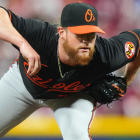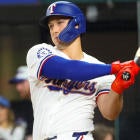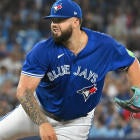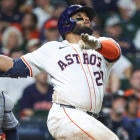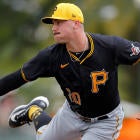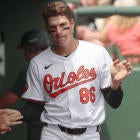Note: Don't whiff on this special FanDuel offer. Win your first contest or get your money back (up to $10) to keep playing. Try FanDuel now!
As opening day trickles into its third day, I'm still reeling from the loss of A.J. Pollock. I only drafted him in two of my 13 leagues, but both of those leagues had category formats where I was coveting Pollock's combination of power, steals and an above-average on-base percentage (both were OBP leagues).
One of those leagues was the Tout Wars mixed auction, a 15-team Roto league with a 5x5 format. I wasted no time in trying to fill the five-category crater left by Pollock's surgery-induced absence. I am recounting my efforts here, because it could serve as a useful lesson for owners who need to replace the centerpiece of their roster. If you're a Pollock owner who has yet to execute a recovery plan, you'll likely encounter the same dilemmas I did. If you're not, it's only a matter of time before you will face a similar situation.
Upon hearing the news about Pollock, my first hope was that I could luck out with a replacement found on the waiver wire. Not surprisingly, after we had auctioned off 345 players and drafted another 90 in reserve rounds, the waivers were pretty barren. Nonetheless, I loaded up my queue for the first round of weekly FAAB bidding, making Joey Rickard my top priority and lining up Tyler Naquin and Melvin Upton as contingent options. Not exactly the strongest candidates for replacing Pollock's production.
Enter MLB.com's Fred Zinkie, who has rightfully earned the reputation of being an extremely active trader. I received an offer from Fred just under three hours from our first lineup deadline, along with the following message.
This Pollock thing sucks. But I have an extra OF, if you want to replace him with more than what the waiver wire has to offer.
Yes, I think I would like an outfielder who is better than Rickard, Naquin or the elder Upton. This message arrived while I was in the midst of setting my 12 other lineups, so there is little to no time to scout out potential deals with other owners. I decide to go ahead and weigh Fred's offer: His Matt Kemp, Welington Castillo and Joe Ross for my Buster Posey and Robbie Ray.
I like Kemp more than most, and I have soft spots for Castillo and Ross as well. However, I was finally willing to pay up for Posey this year, and this didn't feel like enough return. Two hours, 21 minutes and 20 emails later, we agreed on the following deal: Kemp, Russell Martin and Ross for Posey and Hector Rondon. It wasn't too different from the original offer, but the upgrade from Castillo to Martin eased my concerns about losing Posey. I was also already weak in saves and have confidence in my ability to find useful relievers on waivers, so it didn't take much to convince me to include Rondon.
There was more to my willingness to make the deal than just getting an acceptable catcher in return. The clock was ticking, with just minutes left until lineups locked. This is no small detail, and it's one worth exploring, because at some point, we will all have to consider proposals in less-than-ideal circumstances. It's one thing when you're floating a player out on the market in no particular hurry, looking to see what value you can get. It's another when you are trying to fill a hole left by the player you were planning on building your team around, and the first pitch of the season is just minutes away.
My decision to move forward with the deal begs the question, "What's the hurry?" I can't be sure I could have received a better offer for Posey out on the market, but now I'll never know. Ultimately, I was fine with letting Posey go without getting other offers, because I wanted to put my best possible lineup out for Week 1. Last season, I was lax in replacing hurt and underperforming players, because I thought I had ample time. Perhaps it's overcompensating, but I liked the offer I had on the table, and didn't want to lose ground in the standings while I considered other offers.
I also figured Posey's value was never going to be higher. This is not to say I thought I overpaid or that I was expecting him to decline or regress this season. It's just that, while there is some chance he could get hurt or have an off year, I saw little chance that Posey would be substantially better than I expect him to be. I thought the same would be true for Rondon, who plays for a manager who doesn't seem especially wedded to his closers and is part of a bullpen that features several pitchers who could probably be effective in the ninth inning.
In an uncertain situation such as this one, the risks can be particularly daunting. While I maximized my lineup for the first week and traded players at what could be their peak value, I gave up the best player in the deal, and possibly by a great margin. As mentioned above, I also had foregone the opportunity to see if I could have gotten a bigger return on the market.
With a more patient mindset, I also could have given some of the players on my roster an opportunity to fulfill their potential and create areas of surplus. That would have allowed me to trade from a position of greater strength. For example, I could have waited to see how the Jose Reyes situation played out, allowing the possibility that Trevor Story could build up his value. In spending $11 on Justin Verlander and $7 on Yordano Ventura, I made modest bets on both players being better than they have been the last two seasons. If both pitchers got off to strong starts, I might have been able to deal one as part of a package for a top outfielder.
So in retrospect, was it a bad idea to rush my response to losing Pollock? The answer won't likely be clear until July or August, but it feels like it was. If I had passed on the trade and missed out on Kemp, I would have lost his six-game week, including three games at Coors Field. Some of that lost production could have been defrayed by the difference between Posey and Martin, and with a better trade, I could have made up the remainder pretty quickly. This is a tradeoff that I did not have time to consider while working under a tight lineup deadline.
Even if the trade was a mistake, the good news is that there are still another 25 weeks to go. Players like Story, Verlander and Ventura could still increase their value, and there will be more opportunities to improve my roster.
Even if this deal and subsequent moves (and non-moves) work out in my favor, there is one lesson that I can take away for future trade negotiations involving high-end players like Posey. If I don't have time to consider all of the tradeoffs involved in a deal, the decision can wait at least long enough to entertain competing offers.






















